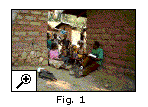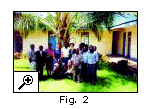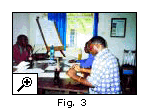|
|
 |
|
| |
The relationship between environment conservation and sustainable socio-economic (SE) development is intrinsic to the implementation of a Lake Tanganyika management program. Therefore the Socio-economic Special Study (SESS) forges a crucial link between long-term sustainability and biodiversity conservation with short-term socio-economic viability. In order to move toward achieving sustainable socio-economic development the SESS identified two principle tasks:
- to provide an understanding of current livelihood strategies and SE practices around the Lake and its catchment area, and
- to suggest ways in which alternative livelihood strategies can be introduced while changes in current practices, which may be detrimental to biodiversity, are encouraged.
From this premise proposals for action have been recommended for implementation by appropriate local, national or international institutions and organisations.
 Socio-economic activities have been conducted in Lake Tanganyika's catchment and along its shoreline. Teams from all four riparian countries were trained to undertake SE activities. A key aspect of the SESS is participation with locally based development professionals who are familiar with the survey areas. (Fig. 1).
Socio-economic activities have been conducted in Lake Tanganyika's catchment and along its shoreline. Teams from all four riparian countries were trained to undertake SE activities. A key aspect of the SESS is participation with locally based development professionals who are familiar with the survey areas. (Fig. 1).
These national participants collaborate with a SE regional facilitator and international SE co-ordinator to facilitate the knowledge exchange that is a particularly successful participatory and capacity building aspect of the SESS. The teams have participated in whole group working meetings as well as separate country workshops (Fig 2 & 3).
 
|
|